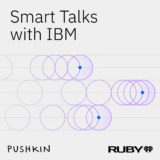Caspar Coppetti is the co-founder of On, a company that makes athletic shoes. Caspar’s problem is this: How can you sell tens of millions of shoes a year ...
After a historic 355 days in orbit, NASA astronaut Mark Vande Hei returned to Earth on March 30, 2022, breaking the record for the longest single spaceflight ...
Matt Rogers is the co-founder of Mill. Matt’s problem is this: How do you turn garbage into food?Before Mill, Matt co-founded Nest, a smart thermostat ...
Jacob Goldstein co-hosts today’s show with Dan Pashman, host of The Sporkful. Jacob and Dan eat their way through the history of fake meat — from ...
Pat Brown is the founder of Impossible Foods. Pat’s problem is this: How can you make meat without animals? Pat’s goal isn’t to make better ...
Ilir Sela is the co-founder and CEO of Slice. His problem: How do you bring the technological revolution to thousands of tiny mom and pop pizza shops? Most ...
Tim Mundon is chief technology officer at Oscilla Power. Tim’s problem is this: How do you turn waves into electrical power? You can see the power of the ...
While we’re off celebrating the new year, here’s an episode from another Pushkin show: Some of My Best Friends Are… Hosts Khalil Gibran Muhammad and Ben ...
Anders Forslund is the co-founder and CEO of Heart Aerospace. Anders’ problem is this: How do you build a commercial airplane that can fly on battery ...
Bayard Winthrop is the founder and CEO of American Giant. Bayard’s problem is this: How do you make clothes in America — and compete in a global ...
Farzad Mostashari is the co-founder and CEO of Aledade. Farzad’s problem is this: How can we pay doctors to keep us healthy, rather than treating us ...
This bonus episode is from Story of the Week with Joel Stein, a new Pushkin podcast. On Story of the Week, journalist Joel Stein chooses an article that ...
Sallie Krawcheck is the founder and CEO of Ellevest, an investment firm for women that has over $1 billion in assets under management. In her career in ...
In May of this year, we interviewed Sam Bankman-Fried, the young billionaire philanthropist who started the crypto exchange FTX. Last week, in a matter of a ...
Stacey Vanek Smith is the author of “Machiavelli for Women: Defend Your Worth, Grow Your Ambition, and Win the Workplace.” Her problem is this: How ...
Cathy Edwards is vice president and GM of Search at Google. Cathy’s problem is this: how do you teach computers to tell people what they want to know, ...
Matt Duesterberg is co-founder and president of OhmConnect. Matt’s problem: How do you build a business around getting people to save energy? Not all ...
Chris Best is co-founder and CEO of Substack. Chris’s problem: How do you help writers make a living from a thousand true fans? Substack is a company ...
Harley Finkelstein is the president of Shopify. He may love entrepreneurship more than anyone we’ve ever met. Harley’s problem: How do you aggregate the ...
Shaun Kinetic is co-founder and chief scientist of Charm Industrial. Shaun’s problem: How do you put billions of tons of carbon back into the ground? Charm ...


